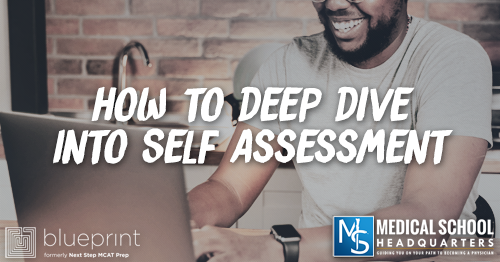Apple Podcasts | Google Podcasts
Session 260
Today, we talk about what your MCAT diagnostic score means and what you should do moving forward from it.
We’re joined by Alex from Blueprint MCAT. If you would like to follow along on YouTube, go to premed.tv.
Don’t forget to check them out and get access to their free full-length one and half-length diagnostic. Plus, get their 1,600 plus flashcards on their brand new spaced repetition platform. Blueprint MCAT is widely considered to have the best third-party MCAT full-length exams out there. Also, get access to an amazing study planner tool and much more!
Listen to this podcast episode with the player above, or keep reading for the highlights and takeaway points.
[03:02] Do You Need to Take a Diagnostic?
Alex encourages students to take the half-length diagnostic test once they’re in the course.
The MCAT exam takes over seven and a half hours long. For many people, not only have they never taken a test that long, but they’ve also never even taken a test anywhere close to MCAT’s length.
“Taking a half-length diagnostic is valuable because it's long enough to cover the scope of the MCAT.”Click To TweetHence, it’s a good introduction to testing on this kind of timeframe. It’s not at the length of the real one, but long enough that you get an idea of what taking the test is like and to provide a solid starting point.
[04:38] Why MCAT Scores are Going Up
The newest AAMC data shows that the average MCAT score for students who matriculate is 511.9 and it’s even higher this year. And everyone’s freaking out thinking the MCAT scores keep going up for matriculated students.
What they’re ignoring is the average MCAT score is also going up, outpacing the average score for matriculants.
The average no longer is 500, which is what we consider the normal bell curve. If you look at that bell curve, it’s shifting. Now, the average MCAT is a 501. Logically, it would make sense that there are more people with higher scores, applying the medical school. It’s not that medical schools are looking for only the higher scores.
'Students are getting better at taking the MCAT and scores are going up because of it.' Click To TweetAnd so, a student takes a diagnostic, and they will then look at that score, whether it’s a 496 or 488 – and it’s pure panic. What do they need to think about when looking at that diagnostic score?
[06:41] How to Analyze Your Diagnostic Score
Alex notices how these students are panicking before they even started taking the diagnostic test. He recommends looking at the full-lengths as tests in a traditional manner, but as snapshots. And if you’re going to improve your performance for this test, you don’t just need one snapshot. You need a series of snapshots to string them together into a trend.
As we always mention here before, taking the MCAT is like a marathon running analogy. Nobody’s going to go out and run a four-hour marathon without any training and without ever stepping foot into a running shoe. It’s the same thing when taking this evaluation. It’s more of a self-reflection.
'The goal of the diagnostic is just to wet your beak, get the joints loosened up, and get you ready to start running.'Click To Tweet[10:49] When to Take a Diagnostic
Alex says you should be taking the diagnostic as soon as you start studying for the MCAT. In the same way that if you want to train for a marathon in six months, you should know what your marathon time is right now.
Now, if you’re starting to study for the MCAT but still a couple of years away from taking the test, you can take the diagnostic. In general, Alex doesn’t recommend you do that. But if you really want to do that and you don’t have the resource available to you, you could always take the diagnostic again.
[13:03] Reframe Your MCAT Journey
For many people, the diagnostic is their first exposure to how the MCAT tests content. One of the reasons they want to pursue medicine is their love of not only science but of problem-solving.
The MCAT is a beautiful problem-solving exercise. And so, if you love problem-solving, then take a step back and look at the the diagnostic as your first exposure to MCAT content.
Links:
SEARCH SITE
SEARCH SITE
LISTEN FOR FREE












